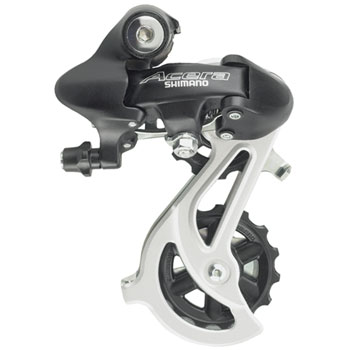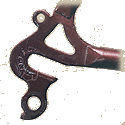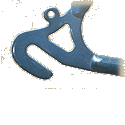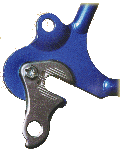Rear Derailleur
https://www.sheldonbrown.com/harris/derailers-rear.html



| Accessories | Bicycles | Parts | Specials | Tools | View Cart |
|---|
 In West Newton Since 1952 - On The Web Since 1995NEW! harriscyclery.net Catalog for a more Contemporary Shopping Experience. |
|---|
Rear Derailleurs from Harris Cyclery
Shimano |
|---|
Adaptor Claws | Cables | Derailers (Front) | Derailers (Rear) | Shifters
A note about range:
Rear derailers are often differentiated into "road" and "mountain" models. This is actually a false distinction based on marketing hype. A more meaningful distinction would be:Generally, in the Shimano line, the wide-range models will handle up to a 34 tooth sprocket; medium-range models will handle up to 30 tooth sprockets, and narrow-range models will handle up to 28-30 tooth sprockets. Wider range models also have more chain takeup capacity, which makes them more compatible with wide range (triple) chainwheel sets.
Range Cage
CodeCage
LengthNote Wide
RangeSGS 86 mm center-to-center If you want to use a rear sprocket bigger than 30 teeth, this is the type you must have.
The marketeers call this a "mountain" size, but that's a bogus designation. This is what you want for most touring applications.Medium
RangeGS 74 mm center-to-center Erroneously called "long cage" in "road" contexts, this is actually the medium length cage.
It is, however the longest that has the marketing designation "road."Narrow
RangeSS 50 mm center-to-center Road racing. SS cage derailers are not recommended for wide-range cassettes or triple cranks. A note about capacity:
Manufacturers have to assume that their customers are clueless, and will expect the chain to have some tension on it even in the bad gears where the chain is using small chainrings with small rear sprockets. Thus, the rated chain-wrap capacity is very conservative. A competent cyclist who uses the gears properly can generally exceed this by several teeth with no problem.Most derailleurs also specify a maximum size rear sprocket. This is often a pessimistic value, based on the largest sprocket that is normally provided as part of that group.
How Many Speeds?
Rear derailleurs often are referred to as "7-speed", "8-speed" or "9-speed." This is not as important a distinction as it might appear. Current model derailers are pretty much interchangeable within brands. A "7-speed" or "8-speed" designation generall just indicates that the derailer is an older design, or a cheaper model. They'll all work with all 3 systems, though the models marked "9-speed" will generally be slightly better (whatever cluster you use.)
| Shimano Rear Derailleurs (Work with most shifters. Check with us if you're not sure.) | |||||||
|---|---|---|---|---|---|---|---|
| Model | Range | Price | Largest Sprocket | Chain Wrap Capacity | Weight | Shimano Series # | Note |
| XT Shadow Top Normal | Wide | 36 | 45 | 235 g | RD-M772 | ||
| Deore SGS Top Normal Works with 10 speed STI shifters | Wide | RD7592 | 34 | 43 | 300 g | RD-M591 | |
| Acera SGS | Wide | 32 | 38 |  | |||
| Tourney MegaRange | Wide | 34 | 40 | ||||
| Tourney MegaRange | Wide | 34 | 40 | With adapter claw | |||
Low-normal vs High(Top)-normal
Most rear derailleurs are pushed by a spring toward the highest (smallest) sprocket, and the shift cable pulls them toward the lowest sprocket. Shimano "Rapid Rise" rear derailleurs ( XTR Rapid Rise, Nexave T400, MegaRange Rapid Rise and Tourney Rapid Rise )work the opposite way, springing toward the lowest (largest) sprocket. This system provides slightly better downshifting, but can be confusing to a rider who is accustomed to high-normal derailleurs. Either type may be used with any contemporary Shimano shifter, but if you use a low-normal derailleur on a shifter made for high-normal, the indicator numbers will read backwards, and you will have to shift in the opposite direction. However, if you use a Rapid Rise derailleur with bar end shifters, both shifters will shift in the same direction ( up will be higher ).Hanger vs Frame Mount
Some derailleurs include a built-in hanger, an adaptor claw that permits them to be attached to a frame that does not have a built-in derailer mount on the right dropout.The adaptor claw's bolt and its special shoulder nut fit in the back of the axle slot. When normally installed, the left end of the wheel's axle will wind up near the middle of its axle slot.
This is normal. There are millions of bikes on the road using this system.
 |  |  |
|---|---|---|
| This dropout fits a standard derailleur | This dropout requiers a derailleur with a hanger, or a separate adaptor claw | Adaptor claw |
Front Derailers
This site also features many
useful articles by Sheldon Brown
and others.Web site by Sheldon Brown
URL: http://harriscyclery.com/derailers-rear.htmlCopyright © 2005, 2008, 2010, 2012, 2013, 2015 Harris Cyclery
Comments
Post a Comment